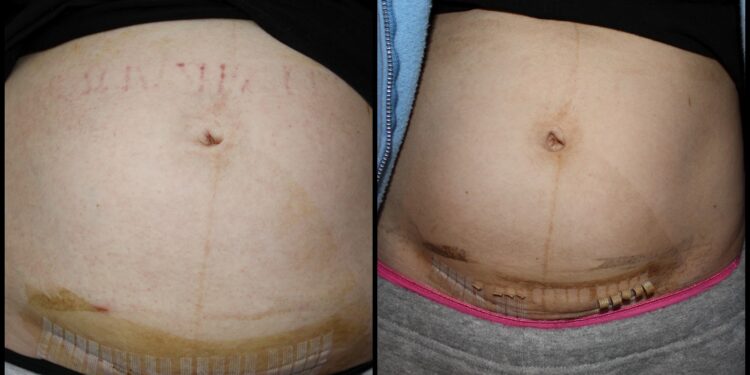Table of Contents
- Some women do experience symptoms related to their C-section scar long after the operation
- Some women feel pain, restriction, or a pulling sensation on or around their scar months or even years after surgery
- This is normally due to the build-up of scar tissue which can stick to muscles or even organs and cause pain
Accordingly, What happens if you lift too much after C-section? After Going Home: Initially, you should avoid lifting anything heavier than your baby, and avoid most housework Your lochia bleeding will change over time and can increase with activity and position changes
What happens if my C-section scar opens? The severity of a C-section opening depends on its location If your outer incision is opening, your doctor will probably give you a local injection to numb the area and then remove the skin or tissue just around the site Then the freshly opened site will be sutured, stapled, or glued again
How do C-section wounds heal inside? People can speed up their recovery from a C-section with the following methods:
- Get plenty of rest Rest is vital for recovery from any surgery
- Ask for help Newborns are demanding
- Process your emotions
- Take regular walks
- Manage pain
- Watch for signs of infection
- Fight constipation
- Get support for breastfeeding
Further, Why does my stomach hurt above my C-section incision? Sometimes, an incisional hernia can cause pain and discomfort, especially when the bulge in the stomach is more noticeable This symptom can be a challenge for a new mom to recognize at first The healing process after a cesarean delivery can cause discomfort
What happens if I bend after C-section?
Although you should be able to safely bend after a C-section, there might be signs that something needs medical attention “If you’re in a lot of pain, feeling dizzy, or are having bleeding through the bandage, you should speak to your doctor right away,” says Prabakar
Can you lay on side after C-section?
Specifically, you should focus on sleeping on your left side since this gives you optimal blood flow and also makes digestion easier You may need a body pillow or other supportive aids to get comfortable and provide proper support for your abdomen and hips
Why did my C-section incision open?
The opening of a wound may be a minor issue, such as when a suture comes loose or a very small area of the incision starts to pull apart But it may also be a major problem if the entire incision opens, particularly if you can see the tissue below or if it starts to come out through the incision
Can C-section open internally?
An internal C-section opening or rupture is rare, but much more serious You’ll likely need to have surgery to close this In very rare cases, the uterus might need to be removed if it’s very damaged or infected This surgery is called a hysterectomy
What are the first signs of internal bleeding?
The signs and symptoms that suggest concealed internal bleeding depend on where the bleeding is inside the body, but may include:
- pain at the injured site
- swollen, tight abdomen
- nausea and vomiting
- pale, clammy, sweaty skin
- breathlessness
- extreme thirst
- unconsciousness
How do you know your internal stitches are healing?
The edges will pull together, and you might see some thickening there It’s also normal to spot some new red bumps inside your shrinking wound You might feel sharp, shooting pains in your wound area This may be a sign that you’re getting sensations back in your nerves
Can you be bleeding internally and not know it?
Intra-abdominal bleeding may be hidden and present only with pain, but if there is enough blood loss, the patient may complain of weakness, lightheadedness, shortness of breath, and other symptoms of shock and decreased blood pressure Once again, the symptoms depend upon where in the abdomen the bleeding occurs
How long can you survive with internal bleeding?
Even a small hemorrhage can quickly become life-threatening In severe cases, internal bleeding can cause death within 6 hours of hospital admission
Can internal bleeding heal on its own?
Often, GI bleeding stops on its own If it doesn’t, treatment depends on where the bleed is from In many cases, medication or a procedure to control the bleeding can be given during some tests







